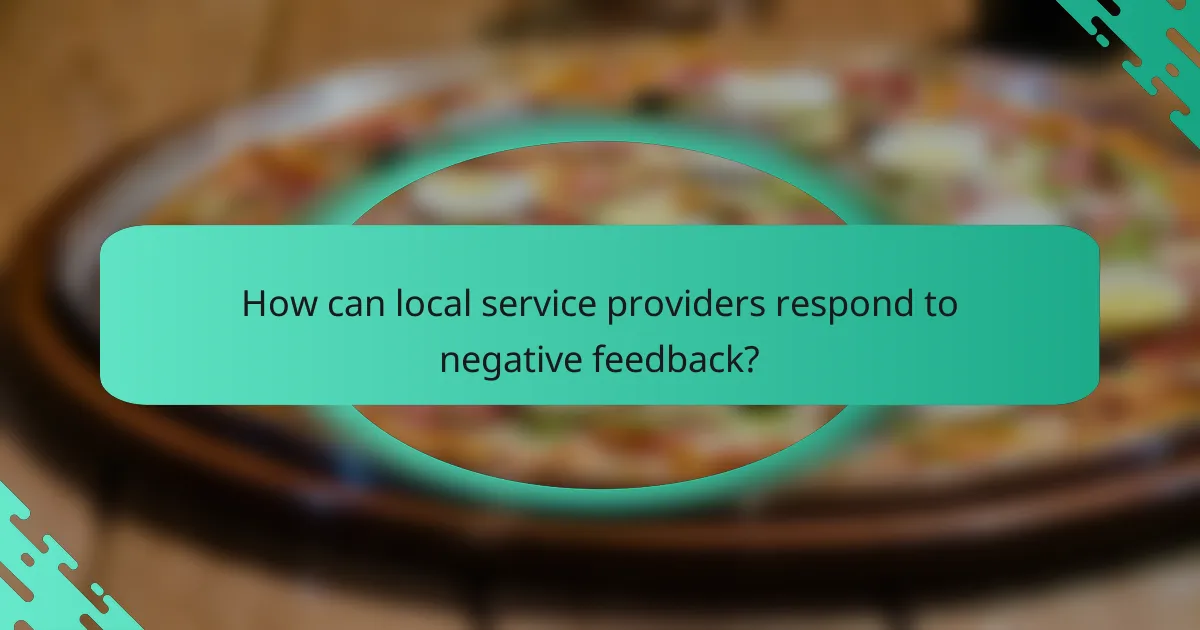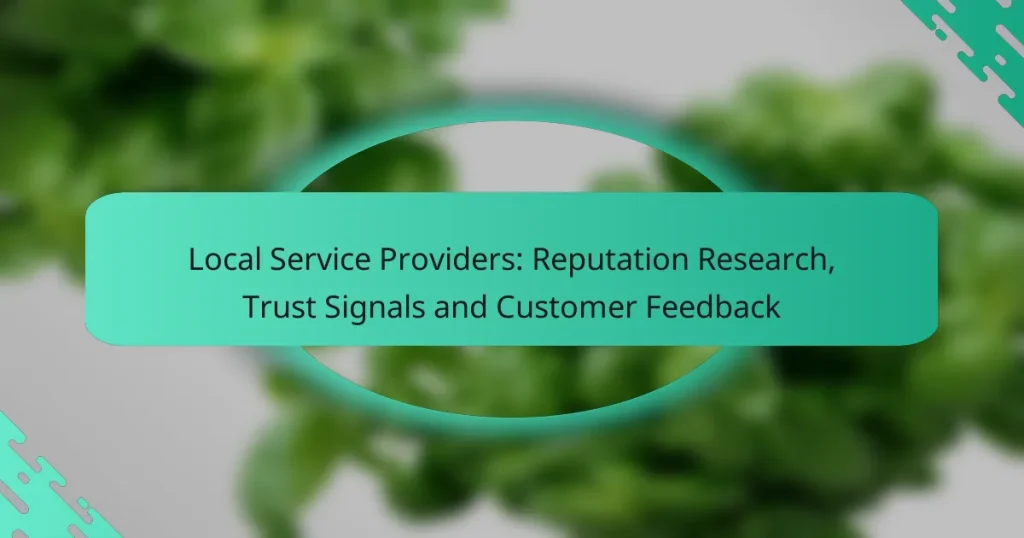Local service providers can significantly enhance their reputation by effectively managing customer perceptions through trust signals and feedback. By focusing on transparent communication, certifications, and industry awards, they can build credibility and reassure potential clients. Additionally, actively seeking and responding to customer feedback allows providers to improve their services and attract new clientele.

How can local service providers enhance their reputation?
Local service providers can enhance their reputation by actively managing customer perceptions through various strategies. Focusing on trust signals, customer feedback, and transparent communication can significantly improve how they are viewed in their communities.
Utilizing customer testimonials
Customer testimonials are powerful tools for building trust and credibility. By showcasing positive experiences from satisfied clients, local service providers can create a compelling narrative that resonates with potential customers.
To effectively utilize testimonials, providers should collect feedback regularly and display it prominently on their websites and marketing materials. Video testimonials can be particularly engaging, as they add a personal touch and authenticity.
Implementing quality assurance programs
Quality assurance programs help ensure that services meet established standards, which can enhance a provider’s reputation. These programs often involve regular training, performance evaluations, and customer satisfaction surveys.
Providers should consider adopting industry-specific quality standards to guide their practices. Regularly reviewing and updating these programs can help maintain high service levels and address any emerging issues promptly.
Engaging with online reviews
Engaging with online reviews is crucial for local service providers looking to enhance their reputation. Responding to both positive and negative reviews shows that a provider values customer feedback and is committed to improvement.
Providers should monitor platforms like Google My Business and Yelp, responding promptly and professionally. Addressing negative reviews constructively can turn a dissatisfied customer into a loyal one, while thanking satisfied customers reinforces positive relationships.
Showcasing case studies
Case studies provide detailed insights into how a service provider has successfully addressed specific client needs. By presenting real-world examples, local providers can demonstrate their expertise and problem-solving abilities.
When creating case studies, focus on the challenges faced, the solutions implemented, and the results achieved. This not only builds credibility but also helps potential clients envision how similar services could benefit them.
Leveraging social media presence
A strong social media presence allows local service providers to engage with their community and showcase their work. Platforms like Facebook, Instagram, and LinkedIn can be used to share updates, promotions, and customer interactions.
Providers should post regularly and interact with followers to build a loyal online community. Sharing user-generated content, such as customer photos or reviews, can further enhance trust and encourage new clients to reach out.

What trust signals are most effective for local services?
Effective trust signals for local services include certifications, industry awards, and guarantees. These elements help build credibility and reassure potential customers about the quality and reliability of the service provided.
Displaying certifications and licenses
Displaying relevant certifications and licenses is crucial for establishing trust in local services. These credentials demonstrate that the provider meets industry standards and regulations, which can vary by location and service type.
For example, a licensed electrician in the United States must adhere to local codes and safety regulations. Customers should look for visible proof of these credentials, such as framed licenses or digital badges on websites.
Highlighting industry awards
Industry awards serve as powerful endorsements for local service providers. Winning or being nominated for awards indicates recognition from peers and experts, which can enhance a business’s reputation.
For instance, a local landscaping company that has received awards for excellence in design can leverage this achievement in marketing materials. Highlighting such accolades on websites and social media can attract more customers seeking reputable services.
Providing guarantees and warranties
Offering guarantees and warranties is an effective way to instill confidence in customers. These promises assure clients that the service will meet their expectations, and if not, they can receive a refund or correction at no additional cost.
For example, a local home repair service might offer a one-year warranty on workmanship. This not only protects the customer but also reflects the provider’s commitment to quality, making them a more appealing choice.

How does customer feedback impact local service providers?
Customer feedback significantly influences local service providers by shaping their reputation and guiding improvements. Positive reviews can attract new clients, while negative feedback can deter potential customers and highlight areas needing attention.
Influencing potential customers’ decisions
Customer feedback plays a crucial role in influencing potential customers’ choices. Reviews and ratings on platforms like Google, Yelp, or Facebook provide insights into the quality of service offered by local providers. A high rating or numerous positive testimonials can lead to increased inquiries and bookings.
For instance, a local plumbing service with a 4.5-star rating and several glowing reviews is more likely to be chosen over a competitor with a lower rating. Prospective clients often rely on the experiences of others to gauge reliability and service quality.
Driving service improvements
Feedback from customers serves as a valuable tool for driving service improvements. Local service providers can identify common issues or areas of dissatisfaction through reviews, allowing them to make necessary adjustments. This proactive approach can enhance service delivery and customer satisfaction.
For example, if multiple clients mention long wait times for appointments, a service provider might consider hiring additional staff or optimizing scheduling processes. Regularly reviewing feedback can lead to continuous improvement and better overall service quality.
Building brand loyalty
Customer feedback is essential for building brand loyalty among local service providers. When clients feel heard and see their suggestions implemented, they are more likely to return and recommend the service to others. Engaging with feedback, whether positive or negative, fosters a sense of community and trust.
For instance, a local bakery that responds to customer suggestions about new flavors or dietary options demonstrates that it values its clientele. This responsiveness can turn first-time customers into loyal patrons, ultimately benefiting the business’s long-term success.

What are the best practices for collecting customer feedback?
Effective customer feedback collection involves using diverse methods to gather insights that can enhance service quality. Best practices include utilizing surveys, conducting follow-up calls, and encouraging online reviews to ensure a comprehensive understanding of customer experiences.
Using surveys and questionnaires
Surveys and questionnaires are structured tools that allow businesses to gather specific feedback from customers. They can be distributed via email, website pop-ups, or in-person, and should include a mix of open-ended and closed questions to capture both quantitative and qualitative data.
When designing surveys, keep them concise to respect customers’ time; ideally, they should take no longer than 5-10 minutes to complete. Offering incentives, such as discounts or entry into a prize draw, can increase response rates significantly.
Conducting follow-up calls
Follow-up calls provide an opportunity for businesses to engage directly with customers and gain deeper insights into their experiences. These calls should be made shortly after a service interaction to ensure the feedback is fresh and relevant.
During follow-up calls, ask open-ended questions to encourage customers to share their thoughts freely. This personal touch not only gathers valuable feedback but also strengthens customer relationships, showing that their opinions matter.
Encouraging online reviews
Online reviews are a crucial trust signal for potential customers and can significantly impact a business’s reputation. Encourage satisfied customers to leave reviews on platforms like Google, Yelp, or industry-specific sites by providing links and simple instructions.
To foster a culture of feedback, consider following up with customers after a purchase or service completion, thanking them for their business, and gently reminding them to share their experiences online. Responding to reviews, both positive and negative, also demonstrates that you value customer input and are committed to improvement.

How can local service providers respond to negative feedback?
Local service providers can effectively respond to negative feedback by addressing the concerns raised, offering solutions, and learning from the criticism. This proactive approach not only helps to resolve issues but also builds trust and improves overall reputation.
Addressing concerns promptly
Responding to negative feedback quickly shows customers that their opinions matter. Aim to reply within 24 to 48 hours to demonstrate commitment to customer satisfaction. A timely response can prevent further escalation and may even turn a dissatisfied customer into a loyal one.
When addressing concerns, acknowledge the issue and express empathy. For example, if a customer complains about a service delay, a response like, “We understand how frustrating this can be and are working to resolve it,” can go a long way in rebuilding trust.
Offering solutions to dissatisfied customers
Providing tangible solutions is crucial in turning negative experiences into positive ones. Consider offering refunds, discounts, or complimentary services as a way to compensate for the inconvenience. Tailor the solution to the specific complaint to show that you value the customer’s experience.
For instance, if a customer is unhappy with a cleaning service, offering a free follow-up cleaning can demonstrate your commitment to quality and customer satisfaction. This not only addresses the immediate issue but also encourages the customer to give your services another chance.
Learning from criticism
Negative feedback can serve as a valuable learning opportunity for local service providers. Regularly review feedback to identify patterns or recurring issues that may need addressing. This can help improve service quality and prevent similar complaints in the future.
Consider implementing a feedback loop where you inform customers about changes made based on their input. For example, if several customers mention long wait times, you might adjust staffing during peak hours. This not only enhances service but also shows customers that their feedback leads to real changes.

What role do online platforms play in reputation management?
Online platforms are crucial for managing a business’s reputation as they provide a space for customer feedback, reviews, and ratings. These platforms help potential customers gauge trustworthiness and quality based on the experiences of others.
Utilizing Google My Business
Google My Business (GMB) is a vital tool for local service providers to manage their online presence. By claiming and optimizing their GMB listing, businesses can control how they appear in local search results and Google Maps, making it easier for customers to find them.
To effectively utilize GMB, ensure that your business information is accurate and up-to-date, including your address, phone number, and operating hours. Regularly post updates, respond to customer reviews, and upload high-quality images to enhance engagement and visibility.
Consider leveraging features like Q&A and booking options to improve customer interaction. Avoid neglecting your listing, as an inactive profile can lead to missed opportunities and a decline in customer trust. Aim for a consistent posting schedule and actively monitor customer feedback to maintain a positive reputation.


